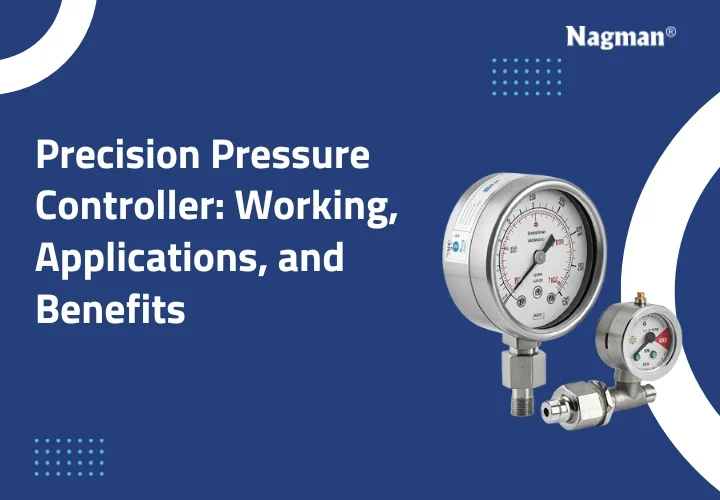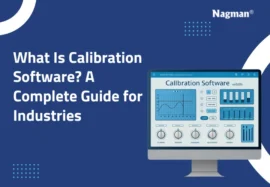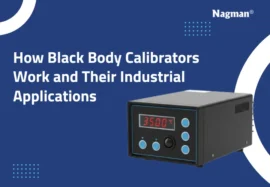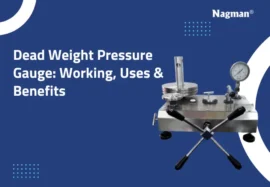Precision pressure management is essential across modern industries, especially in sectors where accuracy is vital in performance and safety. A precision pressure controller is an important device that helps technicians, engineers, and calibration specialists maintain precise pressure levels during critical testing and measurement processes.
In this blog, we discuss the significance of precision pressure control systems, their functionality, key characteristics, and industrial uses.
Introduction to Precision Pressure Controllers in Industrial Calibration
Consistency, traceability, and high accuracy are important in industrial calibration. Pressure instruments need routine calibration to ensure the reliability of gauges, sensors, transducers, and transmitters. Precision pressure controllers are instruments that provide a stable, consistent pressure environment for accurate calibration pressure and are the foundation of reliable instrument verification in laboratories and industrial plants.
These instruments are designed to maintain exact pressure points or gradually increase pressure within a given range, allowing them to be accurately compared with standard or digital measuring tools.
What Is a Precision Pressure Controller and Why It’s Important
A precision pressure controller is an electronic device that produces, controls and stabilises pressure with high accuracy. It removes the variations commonly encountered with a manual pressure system, making calibration data more reliable.
Pressure controllers are significant because they enhance operational safety, comply with industry standards, and support quality control. In the absence of accurate control, industries experience equipment malfunction, process inefficiency and audit failures.
Working Principle of a Precision Pressure Controller
The working mechanism is characterised by three major steps: pressure generation, fine control, and continuous monitoring. The system in an automatic pressure controller uses electro-pneumatic valves and high-resolution sensors to deliver quick and consistent pressure adjustments.
After entering the desired setpoint, the controller slowly adjusts the pressure using proportional valves until the desired value is reached. Feedback loops ensure real-time correction, and the built-in algorithms provide stable pressure under dynamic testing conditions.
Components and Design of a Precision Pressure Controller
Modern precision pressure controllers consist of multiple components:
- High-accuracy and precision pressure sensors.
- Electro pneumatic or servo-operated valves.
- Internal pressure generation mechanisms, e.g., pumps or regulators.
- Microprocessor-based control modules.
- User interface with digital display.
- Communication ports for system integration.
Integration of Pressure Controllers with Calibration Systems
Pressure controllers are extensively used in advanced systems with automated processes to enhance productivity and measurement confidence. When combined with multifunction process calibrators or laboratory reference instruments, controllers form a seamless ecosystem that controls pressure generation, measurement, and documentation.
Controllers available today are also compatible with automated software environments, allowing calibration without human intervention. This minimises errors and speeds up repeatability tests, leak tests and pressure sensor validation
Key Features and Performance Parameters to Consider
In industries, the precision pressure controller is usually evaluated based on:
Key advantages include:
- Accuracy and repeatability
- Stability over time
- Control resolution
- Compatibility with multiple industrial instruments.
- Pressure selection and modular options.
- Response time and settling behaviour.
- Compatibility with calibration software.
- Safety features
- Communication protocols like Ethernet, USB, and RS-232.
Industrial Applications of Precision Pressure Controllers
Regulating pressure is a key requirement in industries. Its common uses include:
- Pressure gauge, sensor and transmitter calibration.
- Aerospace testing environments.
- Power generation and energy plants.
- Pharmaceutical manufacturing
- Oil and gas instrumentation
- Automotive component testing.
- Research laboratories
- Quality control facilities
Advantages of Using Automatic Precision Pressure Controllers
Automated systems come with several operational advantages:
- Improved precision and minimised measurement error.
- Faster and more reliable calibration processes.
- Fewer human errors in pressure adjustment.
- Improved workflow automation.
- Greater traceability for audits and compliance.
- Lower maintenance requirements than manual setups.
- Ability to integrate with existing digital calibration frameworks.
These benefits help industries simplify calibration processes while maintaining reliable and consistent test conditions.
Future Trends in Digital and Automated Pressure Calibration
The future of pressure calibration will focus on increasing automation, monitoring devices with IoT and managing cloud data. Some emerging automatic pressure controllers also include AI-supported diagnostics, self-calibration alerts, and better connectivity for integrated systems.
As industries continually demand greater precision, consistency, and speed, the development of digital pressure tools will ensure safer work, improved repeatability, and faster calibration results.






